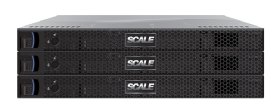
3dmentat - Fotolia
Scale Computing HC3 hyper-converged hardware gets edgy
Scale Computing 1U edge nodes allow easy deployment by retailers in multiple sites that lack on-site IT. The Scale Computing storage layer removes the need for RAID-based data protection in the box.
Scale Computing is doubling down on bringing its hyper-converged infrastructure appliances out to the edge. The vendor launched a new line of appliances designed largely for use in small sites without IT staff, such as grocery stores and retail chains.
The Scale Computing HE500 line includes three 1U racks and two 1U towers, all available as all-flash or hybrid storage. HE500 nodes use the same base hardware and HyperCore software as the Linux-based Scale Computing HC3 hyper-converged infrastructure (HCI) systems. The "E" in HE500 designates the new gear's intended use in edge deployments remotely managed in a core data center.
Pricing starts at $5,000 per node and $16,500 for a three-node cluster.
Scale goes downscale
Scale Computing HC3 arrays integrate a KVM-flavored hypervisor. Kernel-based virtual machine, or KVM, is open source, which customers such as Jerry's Enterprises prefer as an alternative to avoid VMware licensing costs. Most HCI vendors are geared for VMware virtualization.
Based in Edina, Minn., Jerry's Enterprises runs supermarkets and other retail stores across the United States. Jeff Miller, president of IT at Jerry's Enterprises, said he chose Scale Computing HC3 to ensure uptime at stores, especially stores that accept federal electronic benefit cards for food stamps.

"I got the Scale Computing because we needed something I could plug in that would run all the time," Miller said. "If my point-of-sale system is down for an hour in [some] stores, I could lose $100,000 to $2000,000. Multiply that by our 25 stores."
Also known as HC3 Edge, the new 1U nodes combine the Scale Computing HC3 HyperCore operating software on Lenovo compute servers. Lenovo is a Scale Computing investor.
HE500 is an outgrowth of Lenovo and Scale's partnership with Netherlands-based grocery giant Ahold Delhaize.
Eric Slack, a senior analyst for storage at Evaluator Group, based in Boulder, Colo., said the HE500 line allows Scale Computing to build on the SMB market it has already developed.
"The Scale technology has an engine that distributes the data, and it has its own hypervisor," Slack said. "The new HC3 appliances feed into Scale's market in SMBs. Their original platform was scale-out storage, and they've worked on the stack to make it more efficient. They've got a foundation with SMBs, and that's allowed Scale to pursue larger development partnerships" by modifying its hardware, as it did for Ahold Delhaize.
Scale already had customers using its systems in edge deployments, but those were not designed specifically for that use case.
Dave Demlow, a Scale Computing vice president of product management, said the new systems provide a "micro-data-center-ready" infrastructure for thousands of sites that don't have dedicated IT teams.
"Time to deployment and self-healing become even more important in an edge deployment than in the central data center," Demlow said.
The base HE500 is a disk-only box that can be populated with up to 8 TB. The hybrid HE550 has 4 TB of disk and 960 GB of SSD cache, while the all-flash HE550F scales to 960 GB with four SSDs.
The 1U HE500T (8 TB) and HE500TF towers (960 GB) can be placed in a confined space, such as ancillary sales kiosks outside a main store.
Customers can obtain HC3 Edge appliances with 32 GB of RAM and double it to 64 GB. The HE500 systems are compatible with Scale Computing HC1000 and HC5000 appliances. Scale Computing said its architecture removes the need for legacy RAID data protection.





